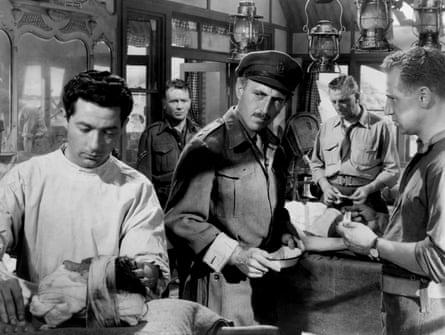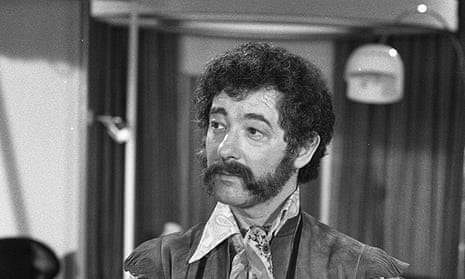Harry Landis, who has died aged 95 of cancer, left behind a poverty-stricken childhood in the East End of London to become a character actor on stage and screen for eight decades. When he stepped out from the wings into the spotlight, he left television viewers with memories of two very different characters, one gentle and sympathetic, the other simply obnoxious.
He spent 18 months in EastEnders (1995-97) as the Polish Jew and Holocaust survivor Felix Kawalski, who owned a barbershop in the fictional Albert Square – keeping in the cellar his father’s treasured collection of butterflies, which he had brought to Britain after fleeing the Nazis. Felix believed his parents and sister had perished.
In Walford, he enjoyed the company of other senior residents – including Ethel Skinner (Gretchen Franklin) and Blossom Jackson (Mona Hammond) – and had a chess partner in Jules Tavernier (Tommy Eytle), who provided platonic friendship for Blossom while she and Felix developed deeper feelings.
When the barber discovered his sister was alive and living in Israel, Blossom joined him on an emotional trip to see him reunited with her. Felix then decided he would join his sister for good and Blossom accepted his invitation to live with them in Israel. On a brief return to the soap in 2010, she revealed that Felix had died five years earlier.
In a very different vein, Landis appeared in the sitcom Friday Night Dinner as the octogenarian Lou Morris, the selfish, arrogant, aggressive boyfriend of Eleanor Buller (Frances Cuka), whose daughter brings the Jewish Goodman family together over a weekly meal.

He popped up in only three episodes, in 2012 and 2014, but immediately made an impression, with Lou crashing his battered old car into the Goodmans’ house on his first visit – and demanding they pay for the damaged headlamp. The family are aghast to find out he is married, appalled at his manner, tired of his boasting about the button factory he owns and irritated by his obsession with wiping his hands on their curtains.
When his wife dies at the age of 94, he becomes engaged to Eleanor, but even she realises her big mistake – feigning a heart attack on their wedding day as the rabbi asks them to exchange vows.
Harry was born Hyman Londinsky in Stepney, east London, to Sarah (nee Sadie Chibulam) and Morris Londinsky, both of Polish heritage. His father, a taxi driver, left when he was a baby. He and his mother were regular visitors to the local Jewish soup kitchen. “Mum had to plead her case with the Jewish Board of Guardians, all businessmen from north London who acted as though she’d let the side down for being poor,” he recalled. “They didn’t have a clue about life in the East End.”
Another memory of living in the area was Oswald Mosley’s fascists throwing a brick through their window in the mid-1930s.
On leaving Stepney Jewish school at the age of 14, he worked in a cafe, then as a window cleaner and milkman before taking a job in a factory. During tea breaks, he mimicked Max Miller and other music-hall acts he had seen at the Hackney Empire. His shop steward suggested he go to Unity theatre in King’s Cross, which gave a platform to working-class voices.
He started acting with the amateur company aged 15 and returned to it after doing his national service. David Kossoff and Alfie Bass were among his contemporaries.
When he was 20, a London county council grant enabled him to train at the Central School of Speech and Drama. From there, as Harry Landis, he acted professionally with the Elizabethan Theatre Company, performing Shakespeare, then in repertory theatres.

Later, with the English Stage Company at the Royal Court theatre in 1961, he appeared in The Kitchen as Paul, the pastry cook, a part based on the experience of its writer, Arnold Wesker.
The West End beckoned, with roles as Private Albert Huggins in The Amorous Prawn (Saville theatre, 1962), Bernard in Time Present (performed by the English Stage Company at the Duke of York’s theatre, 1968), Private Mason in Journey’s End (Cambridge theatre, 1972), the father in the world premiere of Arthur Miller’s The Ride Down Mount Morgan (Wyndham’s theatre, 1991) and the Postmaster General in the musical I’d Rather Be Right (Fortune theatre, 1999).
On stage, Landis also directed plays at Unity theatre (1965-66) and was artistic director of the Marlowe theatre, Canterbury (1973-74).
He was prolific on TV, taking more than 100 roles in both dramas and comedies. They included Toby Crackit, Fagin’s lock-picking expert, in a BBC serialisation of Oliver Twist (1962). He was also seen hiring out a heavy to Arthur Daley in a 1982 episode of Minder when Terry is injured.
During his early years on screen, Landis was in many war films, including Hell in Korea (1956), when he shared a room on location in Portugal with Michael Caine, Dunkirk (1958) and The Longest Day (1962), with Richard Burton. Later, he appeared alongside Tom Cruise in Edge of Tomorrow (2014).
He was president of Equity, the actors’ union, from 2002 to 2008, and a director of the Equity Charitable Trust from 1994 to 2001.
Landis’s 1965 marriage to the actor Hilary Crane (nee Strelitz) ended in divorce seven years later. He is survived by Ingrid Curry, his partner of more than 30 years, as well as the daughter of his marriage, Katy, and his stepson, Simon Crane.
Harry Landis (Hyman Jacob Londinsky), actor and director, born 25 November 1926; died 11 September 2022
